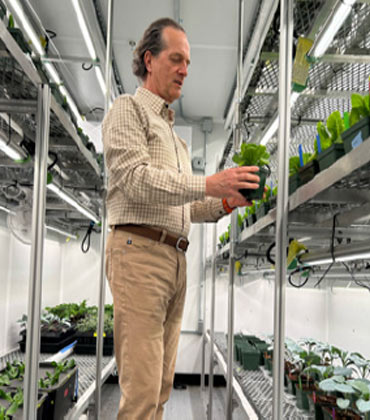Nitrogen has long been an agricultural asset for rich farming, used for generations to improve and increase crop yields. The discovery of synthetic nitrogen has greatly increased the food supply worldwide. However, the production of synthetic nitrogen is not without drawbacks. The process generates four pounds of CO2 for every pound of nitrogen, with 50 percent of what farmers apply to their fields lost to either leaching or volatilization. This inefficiency negatively impacts the environment in the form of water and air pollution. It is estimated that synthetic nitrogen production contributes approximately three to five percent of global CO2 emissions. As demand for food increases and the resulting demand for nitrogen rises, there is a pressing need for a more sustainable solution.
This is where Kula Bio, a leader in sustainable nitrogen solutions, fits in. It produces a high-performance, cost-competitive biofertilizer, Kula-N, that boosts a naturally occurring process to deposit significant amounts of nitrogen in the soil. This helps farmers enhance crop yields and reduce environmental impact. Kula-N is biologically derived, unlike traditional chemical or synthetic nitrogen. The technology employed by Kula Bio harnesses the innate ability of naturally occurring bacteria to fix atmospheric nitrogen. When many nitrogen-fixing microbes are introduced to the soil, they struggle for sustenance and energy, limiting their lifespan to around one day. Consequently, their positive impact is brief and minimal.
Kula Bio’s technology overcomes this limitation by providing their microbes with an independent source of energy before introducing them into the soil. This ensures that once in the soil, they don't need to compete for resources, allowing them to thrive on their energy reserve. As a result, these bacteria remain active for an extended period of approximately two to three weeks. By empowering these microbes with a sustained energy source, Kula Bio enhances their effectiveness in producing nitrogen more consistently and fostering a more sustainable approach to feeding the world's growing population.
“Kula-N is crop-agnostic allowing it to be used on a wide variety of crops, and is not genetically edited, and is an organically certified biofertilizer available in liquid form. It is designed to seamlessly integrate into the farmer's existing irrigation systems,” says Bill Brady, founding CEO, and BOD of Kula Bio.
The solution retains all the advantages of conventional nitrogen, ensuring rapid effectiveness while remaining sustainable and environmentally friendly. It poses no harm to farmers’ soil or surroundings, being pathogen-free and easily applied to fields through typical irrigation methods. Field trials indicate Kula-N has the capability to replace up to 50 pounds of nitrogen per acre. Its features guarantee that the nitrogen is effectively placed in the soil and can be absorbed by any plant.
Kula Bio has conducted extensive research to support the efficacy of Kula-N in the laboratory, growth rooms, and through more than 50 in-field trials. The key outcome of these efforts is the successful replacement of up to 50 pounds of nitrogen per acre, resulting in equivalent or increased yields. This new technology bring an additional tool to the farm that provides an alternate source of nitrogen that will add to soil organic carbon, help decrease nitrogen lose into the environment, and reduces the carbon footprint of a farms nutrient program.
As Kula-N offers farmers the capability to sustain yields while decreasing reliance on synthetic nitrogen, there has been considerable interest in the product by some U.S. states facing upcoming restrictions on synthetic nitrogen applications.
Kula Bio's biofertilizer is a result of collaboration between its in-house team, field agronomists, and commercial partners. They guide farmers on product usage and effectiveness. In 2024, the company plans to enter produce markets, followed by broad-acre row crops, alongside completing a state-of-the-art manufacturing facility in the northeast. This unique approach brings production closer to farms, offering advanced, sustainable solutions that deliver performance outcomes similar to conventional fertilizers.
Kula-N is crop-agnostic allowing it to be used on a wide variety of crops, and is not genetically edited, and is an organically certified biofertilizer available in liquid form. It is designed to seamlessly integrate into the farmer's existing irrigation systems
This is where Kula Bio, a leader in sustainable nitrogen solutions, fits in. It produces a high-performance, cost-competitive biofertilizer, Kula-N, that boosts a naturally occurring process to deposit significant amounts of nitrogen in the soil. This helps farmers enhance crop yields and reduce environmental impact. Kula-N is biologically derived, unlike traditional chemical or synthetic nitrogen. The technology employed by Kula Bio harnesses the innate ability of naturally occurring bacteria to fix atmospheric nitrogen. When many nitrogen-fixing microbes are introduced to the soil, they struggle for sustenance and energy, limiting their lifespan to around one day. Consequently, their positive impact is brief and minimal.
Kula Bio’s technology overcomes this limitation by providing their microbes with an independent source of energy before introducing them into the soil. This ensures that once in the soil, they don't need to compete for resources, allowing them to thrive on their energy reserve. As a result, these bacteria remain active for an extended period of approximately two to three weeks. By empowering these microbes with a sustained energy source, Kula Bio enhances their effectiveness in producing nitrogen more consistently and fostering a more sustainable approach to feeding the world's growing population.
“Kula-N is crop-agnostic allowing it to be used on a wide variety of crops, and is not genetically edited, and is an organically certified biofertilizer available in liquid form. It is designed to seamlessly integrate into the farmer's existing irrigation systems,” says Bill Brady, founding CEO, and BOD of Kula Bio.
The solution retains all the advantages of conventional nitrogen, ensuring rapid effectiveness while remaining sustainable and environmentally friendly. It poses no harm to farmers’ soil or surroundings, being pathogen-free and easily applied to fields through typical irrigation methods. Field trials indicate Kula-N has the capability to replace up to 50 pounds of nitrogen per acre. Its features guarantee that the nitrogen is effectively placed in the soil and can be absorbed by any plant.
Kula Bio has conducted extensive research to support the efficacy of Kula-N in the laboratory, growth rooms, and through more than 50 in-field trials. The key outcome of these efforts is the successful replacement of up to 50 pounds of nitrogen per acre, resulting in equivalent or increased yields. This new technology bring an additional tool to the farm that provides an alternate source of nitrogen that will add to soil organic carbon, help decrease nitrogen lose into the environment, and reduces the carbon footprint of a farms nutrient program.
As Kula-N offers farmers the capability to sustain yields while decreasing reliance on synthetic nitrogen, there has been considerable interest in the product by some U.S. states facing upcoming restrictions on synthetic nitrogen applications.
Kula Bio's biofertilizer is a result of collaboration between its in-house team, field agronomists, and commercial partners. They guide farmers on product usage and effectiveness. In 2024, the company plans to enter produce markets, followed by broad-acre row crops, alongside completing a state-of-the-art manufacturing facility in the northeast. This unique approach brings production closer to farms, offering advanced, sustainable solutions that deliver performance outcomes similar to conventional fertilizers.
Thank you for Subscribing to Agri Business Review Weekly Brief



